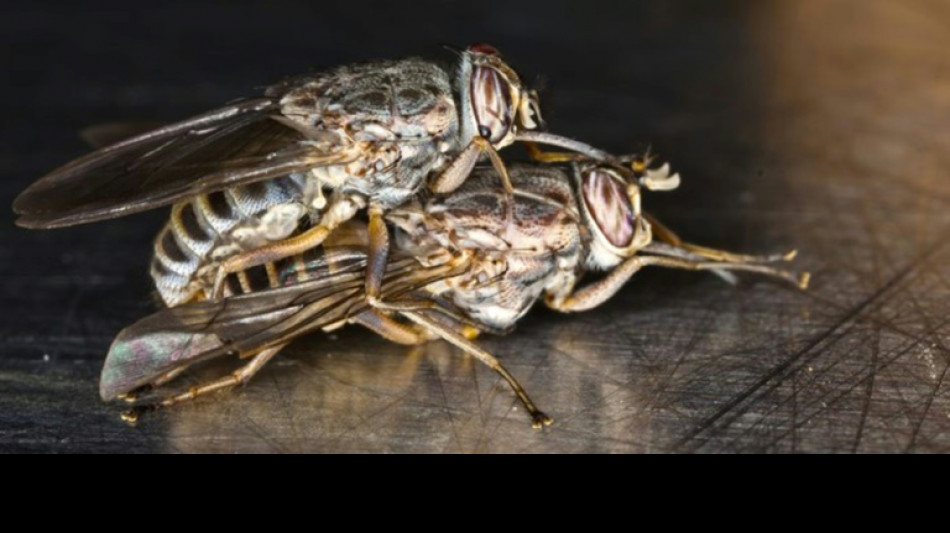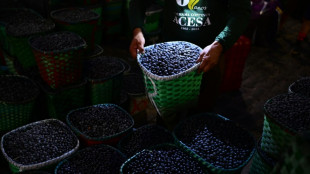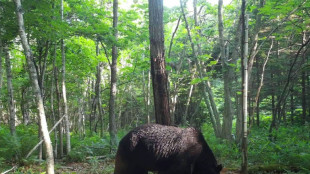
-
 Scandic Trust Group strengthens sales network with First Idea Consultant
Scandic Trust Group strengthens sales network with First Idea Consultant
-
Germany recall Sane, hand El Mala debut for World Cup qualifers

-
 India thump Australia to take 2-1 lead in T20 series
India thump Australia to take 2-1 lead in T20 series
-
Cameroon's Biya, world's oldest president, sworn in for 8th term

-
 Flick holding firm on Barca high line despite defensive woes
Flick holding firm on Barca high line despite defensive woes
-
Battered US businesses eye improved China trade at Shanghai expo

-
 France opt for Le Garrec as Dupont replacement for 'best team ever' South Africa
France opt for Le Garrec as Dupont replacement for 'best team ever' South Africa
-
Drugmaker AstraZeneca profit jumps as US business grows

-
 'Vibe coding' named word of the year by Collins dictionary
'Vibe coding' named word of the year by Collins dictionary
-
Vietnam evacuates thousands from coast ahead of Typhoon Kalmaegi

-
 European stocks fall after gains in Asia, US
European stocks fall after gains in Asia, US
-
MotoGP legend Agostini admires Marc Marquez's 'desire to win'

-
 Nepal searches for avalanche victims
Nepal searches for avalanche victims
-
Hezbollah rejects any negotiations between Lebanon and Israel

-
 Chapman blitz leads Black Caps to tight T20 victory over West Indies
Chapman blitz leads Black Caps to tight T20 victory over West Indies
-
France urges EU to sanction Shein platform

-
 France opt for Le Garrec as Dupont replacement for South Africa Test
France opt for Le Garrec as Dupont replacement for South Africa Test
-
Turmoil in tiaras at Miss Universe pageant in Thailand

-
 Probe into Thales defence group looking at Indonesian contract
Probe into Thales defence group looking at Indonesian contract
-
US to cancel flights as longest govt shutdown drags on

-
 Home in Nigeria, ex-refugees find themselves in a war zone
Home in Nigeria, ex-refugees find themselves in a war zone
-
Doncic's Lakers hold off Wembanyama's Spurs, Blazers silence Thunder

-
 For Turkey's LGBTQ community, draft law sparks existential alarm
For Turkey's LGBTQ community, draft law sparks existential alarm
-
Musk's $1 trillion pay package to face Tesla shareholder vote

-
 Tonga rugby league star out of intensive care after seizure
Tonga rugby league star out of intensive care after seizure
-
Argentine ex-president Kirchner goes on trial in new corruption case

-
 Dams, housing, pensions: Franco disinformation flourishes online
Dams, housing, pensions: Franco disinformation flourishes online
-
Endo returns as Japan look to build on Brazil win

-
 Franco captivates young Spaniards 50 years after death
Franco captivates young Spaniards 50 years after death
-
German steel industry girds for uncertain future

-
 IPL champions Bengaluru could be sold for 'as much as $2 billion'
IPL champions Bengaluru could be sold for 'as much as $2 billion'
-
Budget impasse threatens Belgium's ruling coalition

-
 New Zealand ex-top cop admits to having material showing child abuse, bestiality
New Zealand ex-top cop admits to having material showing child abuse, bestiality
-
BoE set for finely balanced pre-budget rate call

-
 Australian kingpin obtains shorter sentence over drug charge
Australian kingpin obtains shorter sentence over drug charge
-
Weatherald's unenviable Ashes task: fill giant hole at top left by Warner

-
 Ovechkin first to score 900 NHL goals as Capitals beat Blues
Ovechkin first to score 900 NHL goals as Capitals beat Blues
-
On Mexico City's streets, vendors fight to make it to World Cup

-
 Asian markets bounce from selloff as US jobs beat forecasts
Asian markets bounce from selloff as US jobs beat forecasts
-
Philippine death toll tops 140 as typhoon heads towards Vietnam

-
 Kyrgios targets 'miracle' Australian Open return after knee improves
Kyrgios targets 'miracle' Australian Open return after knee improves
-
'AI president': Trump deepfakes glorify himself, trash rivals

-
 Belgium probes drone sightings after flights halted overnight
Belgium probes drone sightings after flights halted overnight
-
Five things to know about 'forest COP' host city Belem

-
 World leaders to rally climate fight ahead of Amazon summit
World leaders to rally climate fight ahead of Amazon summit
-
Engine fell off US cargo plane before deadly crash: officials

-
 Mexican leader calls for tougher sexual harassment laws after attack
Mexican leader calls for tougher sexual harassment laws after attack
-
Meghan Markle set for big screen return: reports

-
 Japan deploys troops after wave of deadly bear attacks
Japan deploys troops after wave of deadly bear attacks
-
FIFA announce new peace prize to be awarded at World Cup draw in Washington


Discovery of tsetse fly mating behavior may help curb sleeping sickness
Researchers have identified chemicals in tsetse flies that control their mating behavior, a discovery that may well aid the fight against the disease-causing insects in sub-Saharan Africa.
"It could be used in traps to make them more effective in trapping tsetse flies," said John Carlson, a biology professor at Yale University and one of the authors of a study published Thursday in the journal Science.
Trypanosomiasis, also known as sleeping sickness, is caused by parasites transmitted by the tsetse fly. It affects humans and domestic animals.
The disease threatens millions of people in dozens of countries in sub-Saharan Africa.
Animal trypanosomiasis, known as Nagana, kills some three million cattle each year, an annual cost of $1.2 billion, according to a companion article in Science.
It is considered a major cause of rural poverty and the authors warned that the geographic range of the tsetse fly is expected to grow as a result of climate change.
For the study, the researchers focused on pheromones, chemical compounds an animal releases that affect the behavior of others of the same species.
Pheromones allow insects to identify each other in an environment where there are potentially thousands of other species.
The Yale researchers identified volatile sex pheromones that had not previously been isolated in tsetse flies despite more than a century of study.
Pheromones are currently used to control a wide variety of other insect pests such as moths.
Pantry moths, for example, can be caught using sticky traps baited with a plastic disc soaked with an attractive pheromone.
- 'The flies stop moving' -
For the study, the researchers soaked tsetse flies in liquid and then used a gas chromatograph-mass spectrometer to identify specific chemicals.
One of them, methyl palmitoleate (MPO), acted as an aphrodisiac, attracting male tsetse flies.
In tests, male tsetse flies were attracted to decoys -- knots in yarn doused with MPO -- and, unusually, to females of another tsetse fly species.
Olfactory neurons on the antennae of the flies were found to increase their firing rates in response to MPO.
"Not only is MPO an attractant, but it causes tsetse flies to freeze -- the flies stop moving," Carlson said.
Current traps for tsetse flies use animal odors but MPO tends to last longer and could "enhance the effectiveness of traps," he said.
Carlson said field tests using MPO were getting underway in Kenya.
The type of pheromone identified in the study may not be effective against all types of tsetse flies, however.
The study focused on the species Glossina morsitans, a major vector of the disease in cattle, not on Glossina fuscipes, which causes the most human cases of the disease.
But Carlson said he was optimistic that the research methods used could lead to identifying pheromones from other tsetse species.
D.Schneider--BTB




